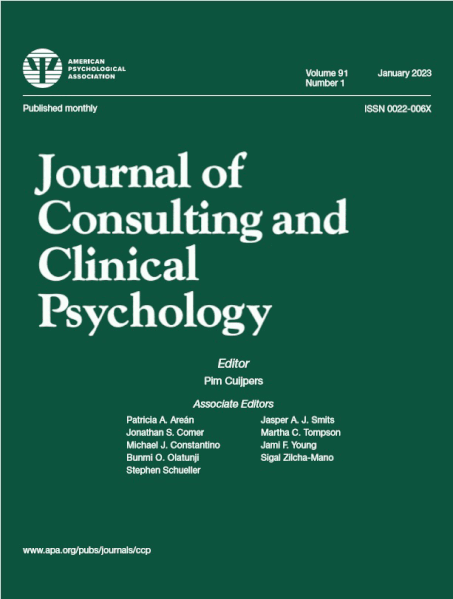Differential effect of early response on outcomes in person-centered experiential therapy and cognitive behavioral therapy for the treatment of adult moderate or severe depression.
IF 5
1区 心理学
Q1 PSYCHOLOGY, CLINICAL
引用次数: 0
Abstract
OBJECTIVE To investigate if Sessions 1-4 Patient Health Questionnaire-9 (PHQ-9) scores are associated with treatment outcome and if there is a differential effect between person-centered experiential therapy (PCET) and cognitive behavioral therapy (CBT). METHOD A secondary data analysis of a prospectively registered and ethically approved pragmatic, noninferiority randomized controlled trial comparing PCET and CBT for the treatment of moderate or severe depression. Latent growth curve modeling was applied to data from 274 patients who received ≥ five sessions of therapy to investigate the association between change in Sessions 1-4 PHQ-9 scores on a binary end-of-treatment outcome (i.e., reliable and clinically significant improvement; RCSI) and on final-session PHQ-9 scores. Estimated power was 80%. RESULTS Change in Sessions 1-4 PHQ-9 scores was significantly associated with the probability of RCSI in the PCET condition (p = .002) but not the CBT condition (p = .156). Specifically, greater early treatment improvement and higher PHQ-9 scores at Session 1 were significantly associated with obtaining RCSI in PCET, but not in CBT; this relationship differed significantly between conditions (p = .007). Greater early treatment improvement was also significantly associated with lower final-session PHQ-9 scores (p < .001), but this relationship did not significantly differ across conditions (p = .121). CONCLUSIONS Early session scores are associated with final-session depression scores, though PCET and CBT manifest distinctively different trajectories for patients achieving RCSI. (PsycInfo Database Record (c) 2025 APA, all rights reserved).早期反应对以人为中心的体验疗法和认知行为疗法治疗成人中重度抑郁症结果的差异影响
目的调查患者健康问卷-9 (PHQ-9)第1-4部分评分是否与治疗结果相关,以及以人为中心的体验治疗(PCET)和认知行为治疗(CBT)之间是否存在差异。方法:对一项前瞻性注册并经伦理批准的实用、非劣效性随机对照试验进行二次数据分析,比较PCET和CBT治疗中度或重度抑郁症的疗效。潜在生长曲线模型应用于274例接受≥5次治疗的患者的数据,以研究1-4次PHQ-9评分的变化与二元治疗结束结果(即可靠和临床显着改善;RCSI)和最后阶段的PHQ-9分数。估计功率为80%。结果1-4阶段PHQ-9评分的变化与PCET条件下RCSI的概率显著相关(p = 0.002),而与CBT条件无关(p = 0.156)。具体而言,在第1阶段,更大的早期治疗改善和更高的PHQ-9评分与PCET中获得RCSI显著相关,但在CBT中没有;这一关系在不同条件下有显著差异(p = .007)。更大的早期治疗改善也与较低的最终PHQ-9评分显著相关(p < 0.001),但这种关系在不同条件下没有显著差异(p = 0.121)。结论:尽管PCET和CBT在RCSI患者中表现出明显不同的轨迹,但早期抑郁评分与最终抑郁评分相关。(PsycInfo Database Record (c) 2025 APA,版权所有)。
本文章由计算机程序翻译,如有差异,请以英文原文为准。
求助全文
约1分钟内获得全文
求助全文
来源期刊

Journal of consulting and clinical psychology
PSYCHOLOGY, CLINICAL-
CiteScore
9.00
自引率
3.40%
发文量
94
期刊介绍:
The Journal of Consulting and Clinical Psychology® (JCCP) publishes original contributions on the following topics: the development, validity, and use of techniques of diagnosis and treatment of disordered behaviorstudies of a variety of populations that have clinical interest, including but not limited to medical patients, ethnic minorities, persons with serious mental illness, and community samplesstudies that have a cross-cultural or demographic focus and are of interest for treating behavior disordersstudies of personality and of its assessment and development where these have a clear bearing on problems of clinical dysfunction and treatmentstudies of gender, ethnicity, or sexual orientation that have a clear bearing on diagnosis, assessment, and treatmentstudies of psychosocial aspects of health behaviors. Studies that focus on populations that fall anywhere within the lifespan are considered. JCCP welcomes submissions on treatment and prevention in all areas of clinical and clinical–health psychology and especially on topics that appeal to a broad clinical–scientist and practitioner audience. JCCP encourages the submission of theory–based interventions, studies that investigate mechanisms of change, and studies of the effectiveness of treatments in real-world settings. JCCP recommends that authors of clinical trials pre-register their studies with an appropriate clinical trial registry (e.g., ClinicalTrials.gov, ClinicalTrialsRegister.eu) though both registered and unregistered trials will continue to be considered at this time.
 求助内容:
求助内容: 应助结果提醒方式:
应助结果提醒方式:


